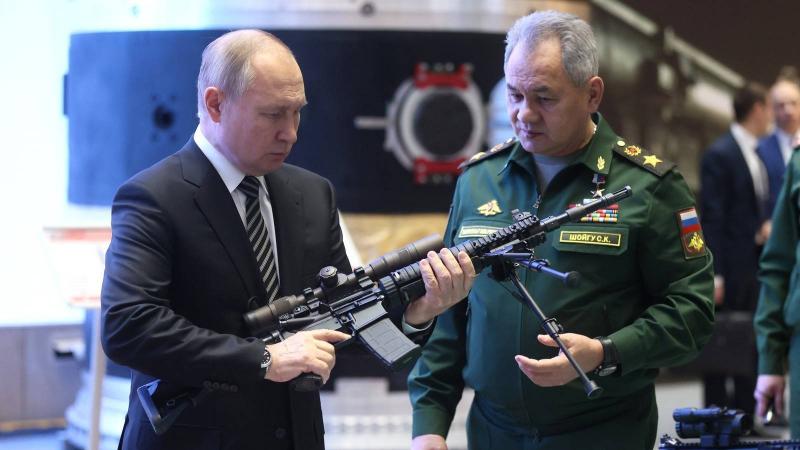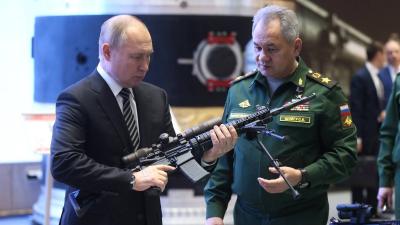As the Ukrainian conflict reaches a deadlock, the possibility of Russian President Vladimir Putin emerging victorious from his ill-conceived invasion cannot be ignored, with all the consequences such a result may have on Europe's security. According to "The Telegraph," Ukraine's failure to achieve a decisive breakthrough during its summer counteroffensive has silenced the optimistic predictions made by Ukrainian President Volodymyr Zelensky and his top leaders that victory was within Kyiv's reach. Instead, the Ukrainian narrative is at risk of sliding into counter-accusations due to the refusal of its Western allies to provide Kyiv with the necessary weapons to break the stalemate on the battlefield. As the Ukrainian leader stated in a recent interview: "We did not receive all the weapons we wanted, and I can't feel satisfied."
The lack of military progress, along with the outbreak of hostilities between Israel and Hamas in Gaza, has deepened feelings of skepticism among some Western leaders about Ukraine's ability to achieve victory. According to "The Telegraph," "there is an increasing sentiment within the Biden administration, for example, that its interests would be better served by pressing Zelensky to demand peace rather than continuing a military campaign that has only a slim chance of success."
On the other hand, Putin is intensifying his efforts to regain military advantage, using the country's strong oil revenues to militarize the Russian economy, resulting in a significant increase in weapons production. He has also permitted an increase in the size of the Russian army by 170,000 soldiers. He hopes this will support efforts to seize key strategic objectives, such as the eastern town of Avdiivka in the Donbas region, which has been the site of intense fighting between Russian and Ukrainian forces.
The idea that the Russian military establishment remains capable of launching an attack 21 months into the invasion of Ukraine was unimaginable just a few months ago, after Moscow suffered a series of devastating setbacks. Although it remains highly unlikely that Putin can achieve his goal of complete occupation of Ukraine and establish a puppet regime in Kyiv, any conclusion that leads to the Kremlin retaining large areas of Ukrainian territory will be welcomed as a victory. Such an outcome would pose a major challenge to the Western alliance, as its ability to withstand Russian aggression will be questioned after all the military support it has provided to Ukraine. This would also encourage Putin to believe he could undertake further aggressive actions against NATO's eastern flank, feeling secure in the knowledge that the West lacks the resources and resolve to resist the Kremlin's expansionist objectives.
The potential for Russia to intensify the threat it poses to European security in the event of modest gains in Ukraine has led several prominent European military experts to publicly question NATO's readiness to face such a challenge. The recent defense conference in Berlin dealt with a doomsday scenario, in which Europe risks facing the same fate the Holy Roman Empire faced under Napoleon, being "pushed to the brink" in a future conflict with Russia due to NATO's inability to defend Eastern Europe. Sönke Neitzel, a leading military historian in Germany, claimed it may take 15 years before his country can defend itself against Russia. His concerns were reinforced by Polish National Security Bureau chief Jacek Siewiera warning that NATO has only three years to prepare for a Russian attack on its eastern flank.
The article noted that "despite the clear threat posed by Moscow, Western leaders appear unwilling to attribute to it the seriousness it deserves. The argument made during the initial stages of the Ukrainian conflict—that ensuring Russia suffers a heavy defeat would deter Putin from further aggression—has been replaced by war fatigue and a desire to end hostilities at any cost, even if that leads to a bold civil war in Russia."
Western responses to the conflict have not fostered better cooperation in defense. Commenting on the stalemate in the Ukrainian conflict, NATO Secretary-General Jens Stoltenberg recently expressed regret over the fragmented nature of defense manufacturing in Europe. He added, "We are not able to work together as closely as we should," warning that Europe's inability to pool resources could undermine efforts to maintain ammunition supplies to Ukraine.
This failure to take seriously the Russian threat is evident in Britain as well, where an analysis of the fall statement issued by Jeremy Hunt last month indicates that the government is unlikely to fulfill its pledge to increase defense spending from 2% to 2.5% of GDP. This is a prerequisite for making our armed forces better equipped to face the Russian threat. It appears that Europe is not only unprepared to allow Ukraine to lose the war but also has little appetite to defend itself against any future Russian aggression.




